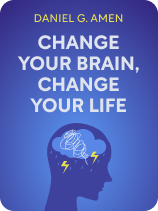

This article is an excerpt from the Shortform book guide to "Change Your Brain, Change Your Life" by Daniel G. Amen. Shortform has the world's best summaries and analyses of books you should be reading.
Like this article? Sign up for a free trial here.
Do you sometimes have trouble recognizing people or finding words? Are you hypersensitive? Why should you hum (even when you know the words)?
In his book Change Your Brain, Change Your Life, brain health expert Dr. Daniel G. Amen discusses cognitive and psychological symptoms and links them to dysfunctions in various parts of the brain. One of these is temporal lobe dysfunction, and he lays out several symptoms and remedies.
Continue reading to learn some of the signs of temporal lobe dysfunction and ways to optimize your health in this area.
Symptoms of Temporal Lobe Dysfunction
If you struggle to comprehend spoken words or fail to recognize the faces of loved ones, or often misinterpret the world around you, you might be experiencing temporal lobe dysfunction. These conditions are in line with the characteristics that Dr. Amen outlines, including:
- Emotional challenges—aggression, negative or violent thoughts, sensitivity to perceived offenses, paranoia, emotional instability, unexplained anxiety or fear, and a tendency to fixate on religious or moral concerns
- Cognitive and language difficulties—word-finding problems, challenges in processing auditory and visual information, memory issues, impaired reading comprehension, periods of absent-mindedness, and a tendency for hypergraphia (excessive writing)
- Sensory and perceptual challenges—abnormal or distorted visual or auditory perceptions, feelings of deja vu, difficulty recognizing known places or individuals, and unexplained headaches or abdominal discomfort
| Other Potential Triggers for These Symptoms While these symptoms can result from damage to the temporal lobes, health experts suggest that they can emanate from a range of other factors. The following list may help you recognize and address causes that you might not have initially considered. Emotional challenges might be due to unmet physical or emotional needs. The tendency to fixate on religious and moral concerns may be a symptom of scrupulosity, a subtype of obsessive-compulsive disorder (OCD). Cognitive and language difficulties can arise from neurological conditions, chronic ear infections, sleep apnea, or a vitamin B12 deficiency. Sensory and perceptual challenges may stem from fevers, migraines, epilepsy, sleep disorders, infections, or disorders such as agnosia or dementia. |
Repair and Optimize Your Temporal Lobes
Dr. Amen’s advice for repairing and optimizing your temporal lobes includes the following strategies:
Engage in rhythmic activities: Participating in activities like chanting or dancing helps you enter a trance-like state that fosters tranquility and open-mindedness, promoting a sense of emotional well-being that stimulates and heals the temporal lobes.
(Shortform note: Oprah Winfrey and Bruce D. Perry (What Happened to You?) link the therapeutic, trance-like effects of rhythmic activities to a subconscious recall of the womb’s security, where the mother’s heartbeat was a constant presence. Another theory suggests that engaging with rhythm beneficially alters brainwaves, synchronizing them with the beat. This increases cerebral blood flow and activity, potentially improving focus and reducing anxiety.)
Practice toning and humming: Using vocalization techniques helps induce relaxation, release pent-up emotions, and alleviate physical discomfort. These effects enhance mental clarity, thereby aiding the temporal lobes in regulating mood and cognition.
(Shortform note: Sound therapists clarify that toning and humming create these benefits by elevating nitric oxide levels. This elevation promotes relaxation, mental clarity, and physical well-being by lowering stress-related markers like blood pressure and heart rate, and shifting brain wave speeds from the active beta state to the slower, more meditative states of alpha, theta, and delta.)
Master anger management: Adopting a five-step approach—focusing on relationship goals, identifying your anger patterns, controlling your breathing, employing distractions, and considering the effects of your anger—helps reduce stress on the temporal lobes.
(Shortform note: Though it might seem easier to live with anger rather than address it, it’s important to process anger because it sparks aggression, an evolutionary remnant of when fight or flight were the only options to survive. In the modern day, the increase in blood pressure and adrenaline that come with anger are usually maladaptive instead of helpful, as they can damage your health and relationships.)

———End of Preview———
Like what you just read? Read the rest of the world's best book summary and analysis of Daniel G. Amen's "Change Your Brain, Change Your Life" at Shortform.
Here's what you'll find in our full Change Your Brain, Change Your Life summary:
- A more effective approach to overcoming physical, mental, and cognitive issues
- The four factors to nurture to improve your brain health
- Why listening to Mozart can enhance your focus and mood control






